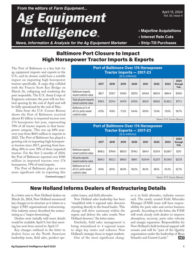The U.S. Department of Energy (DOE) March 7 released a study showing that by 2030, nearly half of medium and heavy-duty trucks will be cheaper to buy, operate and maintain as zero emissions vehicles than traditional diesel-powered combustion engine vehicles.
Published by the DOE’s National Renewable Energy Laboratory, the study finds that continued improvements with zero emission vehicle and fuel technologies will enable clean trucks to become cheaper and more readily available over the next decade. Increased use of battery electric vehicles (BEVs) and fuel cell electric vehicles (FCEVs) within the trucking industry will support the decarbonization of America’s transportation sector and advance goals to accelerate the adoption of electric vehicles, address the climate crisis, and bolster domestic manufacturing.
Medium and heavy-duty vehicles account for less than 5% of the vehicles on the road but produce over 20% of the emissions from the transportation sector, which currently accounts for more than one-third of U.S. greenhouse gas emissions. Key findings of the report suggest that cost competitiveness of zero-emissions medium and heavy-duty vehicles can largely be achieved by 2035. Specifically, the report finds that the costs of zero-emission electric medium and heavy-duty trucks will be the same or lower than those of diesel trucks. Battery electric trucks are expected to become cost-competitive for smaller trucks before 2030 while heavy trucks with less than 500 miles of range are projected to be cost-competitive by 2035. Due to advancements for fuel cells and clean hydrogen production, hydrogen fuel cell electric vehicles are expected to become cost-competitive for long-haul heavy-duty trucks with greater than 500-mile range by 2035.
This report follows the release of DOE’s supply chain report that lays out dozens of strategies to build a secure, resilient and diverse domestic energy sector industrial base. Supply chain improvements lead to more affordable batteries for all applications, and the Bipartisan Infrastructure Law is investing more than $7 billion into the supply chain for batteries over the next 5 years. The law also invests $7.5 billion to expand the nation’s electric vehicle charging network up to 500,000 charging stations.
DOE is facilitating the advancement of the electrification of medium and heavy-duty vehicles. The 21st Century Truck Partnership, a collaboration among truck manufacturers, major suppliers and interagency partners, recently launched a new electrification technical team focused on removing barriers to wide-scale truck electrification. DOE is working directly with industry through SuperTruck 3 program and the Million Mile Fuel Cell Truck (M2FCT) consortium. SuperTruck 3 aims to reduce emissions of freight transportation through electrification, and the M2FCT consortium aims to enable more than a million miles of heavy-duty truck use for next generation fuel cells. DOE is also working to ensure an effective integration of these vehicles in the grid.
View the full study at https://www.nrel.gov/docs/fy22osti/82081.pdf.




Post a comment
Report Abusive Comment